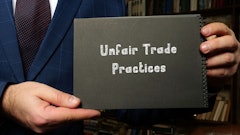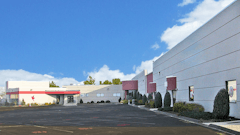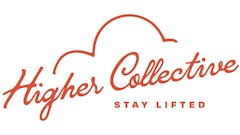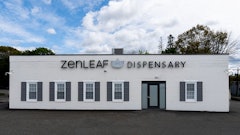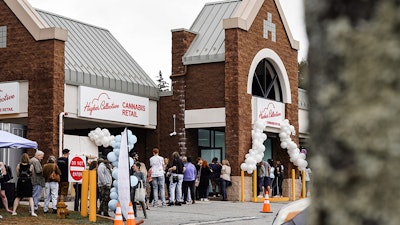
Connecticut-based Higher Collective is just that—a collective made up of industry veterans dedicated to creating an inclusive and equitable cannabis industry, as well as elevating the cannabis market in Connecticut and beyond.
The company’s retail concept, which operates under the Higher Collective banner, officially launched Oct. 7 with the first dispensary opening in Killingly.
The second store will open Oct. 14 in Willington, and five more stores are in the final approval and build-out phase with locations secured. Dispensaries in New London and Hartford are expected to open later this fall, with the additional three stores opening in early 2024.
The Higher Collective team is currently working to find a compliant location for its eighth dispensary.
The Killingly and Willington retail locations will feature drive-thru services, representing the first two drive-thru dispensaries in Connecticut. Customers at these locations can place orders online and pick them up at the drive-thru during the dispensaries’ operating hours.
Higher Collective also operates a cultivation facility and a delivery service in the state.
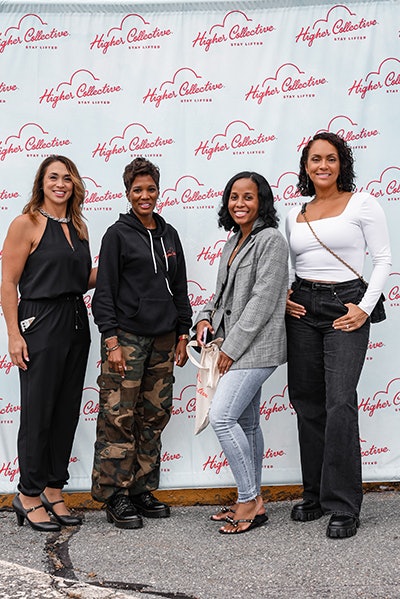
Four of Higher Collective's social equity partners: Angie Lewis, Tori Garrett, Keanaha Abrams and Yanira Wolfgang-Pinto
The company operates the grow, dispensaries and delivery arm with 10 social equity partners in Connecticut. Each social equity partner owns at least 50% of each retail or delivery operation, and each storefront is created in collaboration with the social equity partners.
“It might not be money—we are not necessarily going to invest—but how do we help them with connections, with introducing them to funding or legal help or marketing help, or [help with] how to design a store?” Higher Collective founder and CEO Patrik Jonsson tells Cannabis Business Times. “That was the whole idea.”
Jonsson comes from a senior role at Curaleaf, which now collaborates with Higher Collective and serves as a minority partner for the group through an equity joint venture license structure.
“We’re all very excited about it because when I left Curaleaf, my whole idea was to found this group of do-gooders or people that have the same concept of wanting to help, called the Collective,” Jonsson says. “So, we founded this group called the Collective, which is just really an idea of how do we … help people?”
The Higher Collective team aims to provide resources and blueprints to its social equity partners, ensuring they have the tools necessary for marketing, for example, or to manage the legal side of the business, or to curate the dispensary’s menu.
Higher Collective gives each social equity partner a hand in the creative process to ensure that each retail location embodies the spirit of its social equity owner rather than being cookie-cutter stores throughout the state.
“For example, the Willington store that opens up this weekend, it’s a Latina woman who’s our partner,” Jonsson says. “She’s adding a few elements to her look and feel as far as the artwork, the music, [and] we’re going to have a salsa band there for opening.”
Along those same lines, Higher Collective’s social equity partner in Hartford is a lifelong Hartford resident and is working with local graffiti artists to create a mural on the storefront that depicts his experiences growing up in the city.
“I think there’s going to be a lot of those elements,” Jonsson says. “I’m trying to show [customers] their journey and how they got into the space they’re at. Some of our partners formally have some convictions in cannabis, so we’ll try to integrate that. That store might have a little bit more about the history of wrong persecution against minor convictions and things like that.”
Opening Day Celebrations
Jonsson says the grand opening last weekend in Killingly “went phenomenal.”
“We got such [a] warm reception from the town of Killingly,” he says.
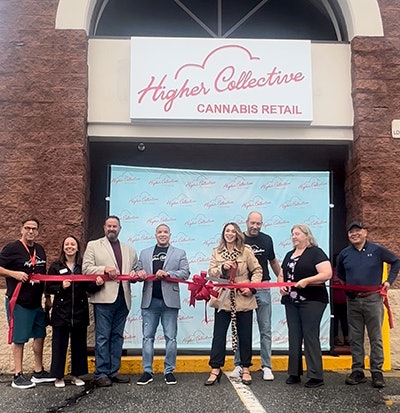
Higher Collective had two opening-day ceremonies in Killingly; there was a ribbon cutting with the local chamber of commerce and state representatives in the morning, and then a company-planned celebration in the afternoon with vendors, food trucks, photo booths and giveaways.
The dispensary had lines out the door the entire day, with customers sometimes waiting a half hour or more for service. Jonsson attributes this, in part, to Higher Collective’s Founder’s Rate program.
The exclusive program is available only on the grand opening day of each of the company’s retail stores. When customers make a purchase on opening day, they will automatically be enrolled in the program, which provides them with a consistent 20% discount on their future purchases until they have saved a total of $1,000.
“If that takes you a year, if that takes you two years, you’ll get a consistent 20 percent off until you’ve earned or saved a thousand dollars from the purchases from any of the Higher Collective stores,” Jonsson says. “Anyone who shows up the first day, we … have gift bags for the first hundred people, but anyone, no matter where you show up in the line, will be entered [and] will become a founder in the Founder’s Club, and that will get you a nice discount for the foreseeable future at any and all of our Higher Collective stores.”
Northeast Expansion
When Higher Collective formed, Jonsson says the idea was to operate in a few markets in the Northeast.
Jonsson worked with Suzan Nickelson in New Jersey to open Holistic Solutions, one of the first Black female-owned dispensaries in the state. The store opened in February, and while its logo is built off Higher Collective’s logo, the dispensary has its own look and feel, much like Higher Collective’s storefronts in Connecticut.
“The thinking when we started was, look, how much harder is it to do four states versus one state?” Jonsson says. “We’re going to reevaluate them when we get a few stores open and see, ‘Hey, do we want to try to do this in a couple more states?’ But to be perfectly honest, it is dependent a little bit on what the state allows you to do.”
Connecticut has proven to be a fairly easy state to set up shop, Jonsson says, as the regulatory framework allows Higher Collective to establish the equity joint ventures with social equity operators.
“I think, for now, we are very much focusing on delivering on our promise to stand up these 10 social equity-owned businesses,” he says. “If I can create 10 minority-owned companies that mean something, then I think I’ve done a decent job."















